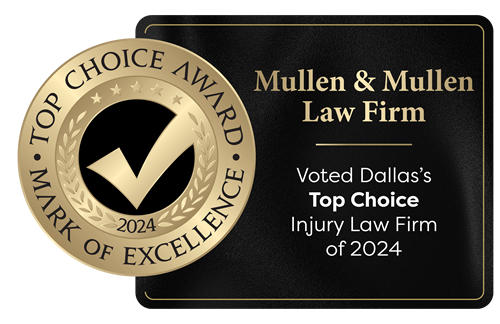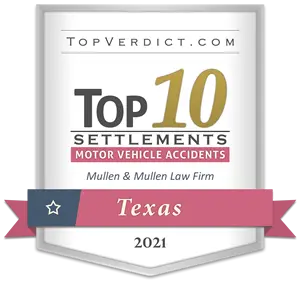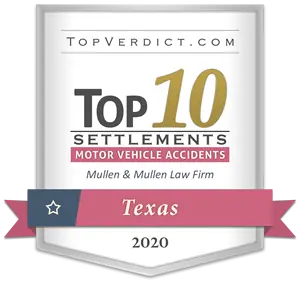Need More Reasons to Choose Mullen & Mullen?
Decades Of Experience
With over four decades of service in Fort Worth and a combined 95 years of legal experience among our three attorneys, Mullen & Mullen is a trusted name in the industry. We’ve secured over $750 million in settlements for clients in North Texas, demonstrating our prowess in handling various accident claims.
Personalized Support
We take a hands-on approach, helping you manage existing medical bills and handling negotiations with insurance companies. Our goal is to alleviate stress and allow you to focus on your physical and emotional recovery.
Comprehensive Investigation
Unlike many other firms, we employ our own accident investigators, ensuring quality work and thoroughness in gathering evidence, interviewing witnesses, and analyzing accident scenes. We go the extra mile to build a strong foundation for your case.
Skilled Negotiators
Insurance companies often try to minimize payouts, but our seasoned accident lawyers excel at negotiations. We are relentless in pursuing fair settlements that cover medical expenses, lost wages, property damage, and more.
Trial-Ready Representation
While we prioritize settlements through negotiation, we won’t hesitate to take your case to court if needed. Our attorneys have a successful track record in the courtroom and are prepared to fight for your rights in front of a judge and jury.
Client-Centric Approach
Your satisfaction is our highest priority. We maintain open and transparent communication, ensuring you stay informed about the progress of your auto accident claim. Your questions and concerns are promptly addressed to provide you with peace of mind during this challenging time.
Choose Mullen & Mullen Attorneys for unparalleled expertise, support, and dedication to your accident claim.
Areas Of Expertise
Top Choice Awards Named Us “Top Injury Law Firm” Six Consecutive Years.

Hundreds Of 5-Star Reviews
I retained Mullen and Mullen (M&M) to represent me after I was involved in a car wreck. They worked hard for me to attain a fair settlement. The staff at M&M are extremely attentive and are always focused on meticulously developing your case to achieve the best possible results. They sent me to the best doctors who were only concerned about my wellbeing, as opposed to previous experiences that I have had where I was just another patient. The attorney on my case, Shane Mullen was extremely detailed and kept me informed through every phase of my case. He checked with me constantly to make sure that I was doing well and, in the end, he was able to get me a fair settlement that I was extremely happy with. I highly recommend Mullen and Mullen Law Firm to anyone that has been the victim of a motor vehicle accident, or any other incident of personal injury. They will fight to get you the best possible results! –Steve Nichols
Mullen and Mullen Law Firm simply put is the BEST. I would like to also say Thank You to Mike Foster and to the whole Mullen & Mullen legal team they truly represent everything that is right for the client. I will always recommend them. It was already a bad situation, and this firm made it better not only with the very best medical care first and foremost but after you are completely healed, vehicle repaired, they will hand you a fat maxed-out settlement check. Thank You. -Joe Marquez
Is Legal Representation Necessary After an Accident?
An accident can have a profound impact on your life. Don’t underestimate the importance of retaining a lawyer to safeguard your interests. Following an accident, victims often face substantial medical expenses and must endure missed workdays while they recover from their injuries.
Even seemingly minor injuries like soft tissue damage or whiplash can lead to significant financial strain. You should not find yourself burdened by debt or on the verge of bankruptcy due to the inability to afford necessary medical treatment.
It’s crucial to remember that insurance companies are primarily concerned with their bottom line, not your well-being or the consequences of the accident on your life. Insurance companies exist to generate profits for their executives and shareholders. The task of the insurance adjuster assigned to your case is to persuade you to accept the smallest possible settlement to absolve the negligent driver of liability.
In fact, the dream scenario for a claims adjuster is that you say something that can be used against you to deny your claim entirely.
Engaging our legal counsel levels the playing field and allows you to focus exclusively on recovering from your injuries. Our attorney fees are contingent, meaning we only receive compensation if you do.
According to a report from a major insurance company, claims represented by a lawyer tend to settle for 2-3 times more than those without legal representation. Many of our cases yield 10-15 times more.
Our role as your attorneys is to advocate for YOUR best interests. We assist victims of motor vehicle accidents in navigating the legal process and help them pursue their legal rights.
As dedicated advocates, we are committed to:
- Assisting you in securing loans for financial relief if necessary.
- Ensuring that you receive the necessary medical treatment without any upfront costs.
- Offering a discounted contingent attorney fee of 29% of the gross recovery for claims that don’t require litigation, compared to the industry standard fee of 33.3%-35%.
- Furthermore, we provide in-house accident investigators at no extra cost to you. While many law firms hire investigators and pass on the expenses to clients, we have dedicated investigators on our team who provide their services without additional charges. This approach enables us to maximize your compensation even further.
Other Things We Do for You
Investigating the Accident
Our accident investigators will conduct a thorough examination of the accident to establish fault if necessary. They collect evidence, including witness statements, police reports, and photographs of the accident scene, to build a compelling case on your behalf.
Evaluating Damages
Your attorney will help you comprehend the full scope of your injuries and the potential costs associated with them. We collaborate with medical experts to assess the long-term consequences of your injuries and ensure you receive compensation for all losses, including medical bills, lost wages, pain and suffering, mental anguish, impairment, and other non-economic damages you’re entitled to.
Negotiating With Insurance Companies
Our attorneys are adept negotiators who will stand up to the insurance company to secure a fair settlement for your injuries and losses. We can guide you through the intricate insurance claims process and make sure you obtain the compensation you deserve.
Representing You in Court
If necessary, our attorneys can represent you in court to safeguard your legal rights. We will present evidence, cross-examine witnesses, and make persuasive arguments on your behalf.
Providing Support and Guidance
Your attorney can offer the support and guidance you require during this challenging time. We’ll answer your questions, offer legal advice, and handle your case with care and compassion.
Our attorneys are an invaluable resource if you’ve been involved in an accident. We will help you understand your legal rights, pursue the compensation you deserve, and provide the support and guidance you need during this challenging period.
The Most Significant Mistake You Can Make Is Attempting To Handle Your Accident Claim On Your Own.
Yes, we do take a portion of your compensation, but we consistently put significantly more money in your pocket than you could ever hope to negotiate independently. We work tirelessly on your behalf to justify our fees. At Mullen & Mullen, we take pride in achieving as many full policy limits settlements as possible.
Comprehensive Overview of Motor Vehicle Collisions
Motor vehicle collisions, commonly known as accidents, occur when one or more vehicles collide with each other or with stationary objects such as trees or buildings. These incidents can be highly destructive, leading to significant injuries for drivers, passengers, and pedestrians alike. Various factors contribute to collisions, including driver errors, vehicle malfunctions, road conditions, and adverse weather conditions.
Most Frequent Types Of Motor Vehicle Accidents
Rear-End Collisions
Rear-end collisions happen when a driver strikes the vehicle in front of them.
Head-On Collisions
Head-on collisions occur when two vehicles collide headfirst from opposite directions. This type of collision is particularly severe, as it results in an impact equal to double the combined driving speeds. Factors like drunk driving, distracted driving, drowsy driving, and unsafe passing often trigger head-on collisions. These incidents frequently lead to fatalities, primarily due to the lack of reaction time by the involved drivers. In cases involving intoxicated or fatigued drivers, braking or swerving is often inadequate. Injuries stemming from head-on collisions encompass spinal cord injuries, permanent paralysis, fractures, soft tissue injuries, traumatic brain injuries, limb loss, and injuries to the knee, hip, and leg.
Side-Impact Collisions (T-Bone Accidents)
Side-impact collisions, also known as T-bone accidents, happen when a vehicle is struck from the side by another vehicle. These incidents typically result from actions like merging into another lane, running red lights, or committing errors at intersections. Side-impact collisions frequently cause severe injuries, including head, neck, chest, pelvis, abdomen, and limb injuries. Traumatic brain injuries can also occur, and fatalities are not uncommon.
Rollover Accidents
Rollover accidents transpire when a vehicle flips onto its side or roof. These incidents can occur independently of other vehicles and may be triggered by factors as simple as hitting a pothole or swerving to avoid a collision. Injuries in rollover accidents can range from none to severe, including spinal fractures and fatalities.
Single-Vehicle Accidents
Single-vehicle accidents involve a vehicle colliding with a stationary object or veering off the road.
Multi-Vehicle Accidents
Multi-vehicle accidents involve multiple vehicles in a single collision event. While relatively rare, they gain significant media attention due to their exceptional nature. Speeding, tailgating, distracted driving, drunk driving, failure to yield, road rage, negligent entrustment, and reckless driving are common causes. Multi-vehicle accidents are exceptionally deadly due to the mass of crumpled vehicles, making escape difficult. Victims who manage to escape are sometimes at risk of being struck by additional vehicles entering the pileup. Fatalities and severe injuries frequently occur in multi-car pileups.
Hit and Runs
Texas law mandates that individuals involved in accidents must stop and provide aid. However, some motorists, driven by fear of legal consequences, increased insurance rates, or panic, choose to flee the scene. Hit-and-run accidents can result in minor or severe damage, causing physical and emotional harm, lasting weeks or months. In the worst cases, hit-and-runs can lead to fatalities.
Frequent Injury Types Resulting From Collisions
According to our legal experts, motor vehicle accidents often result in spinal injuries, which can range from soft tissue damage to more severe conditions like herniated or extruded discs. Indicators of these injuries may include sensations such as numbness, tingling, shooting pains, or weakness.
Additionally, vehicle collisions can directly cause broken bones, fractures, and muscle tears. Here are some of the typical injuries individuals may sustain in motor vehicle accidents:
Theories of Legal Responsibility in Auto Accidents
Our legal team conducts a meticulous examination of your case to identify and assert the most appropriate theories of liability in support of your injury claims. Among the prevailing theories of liability are:
Negligence
The majority of accidents result from the negligence of one of the involved drivers. We contend that the at-fault driver failed to meet the standard of reasonable care, which requires all motorists to act as a reasonably prudent driver would under similar circumstances. For instance, a driver who engages in texting, displays inattentiveness, or fails to yield the right-of-way is considered to be in breach of this duty of care. It’s worth noting that insurance adjusters may attempt to argue comparative negligence, suggesting that you bear partial responsibility for the accident. However, even if you are found to be 50% or less responsible, you are entitled to damages, albeit reduced by your percentage of fault.
Manufacturer Liability
This theory can be invoked if a defect in one of the involved vehicles contributed to the accident. Such cases often involve serious injuries or fatalities and typically necessitate the use of expert witnesses. Common examples of defective parts include seatbelts, airbags, accelerators, brakes, and engines.
Road Design
This theory can be applied in instances involving defective traffic signals, missing signage, unsafe guardrails, or specific roadway defects. Many of these cases involve government entities, requiring the prompt filing of claims with the relevant city, county, or government agency, often within 30 days of the accident.
Wrongful Death
In cases where a loved one has lost their life due to another driver’s negligence or recklessness, a wrongful death lawsuit can be pursued. It is crucial to assess which family members have valid claims and collaborate with an attorney to determine whether emphasis should be placed on wrongful death or survivorship claims.
Respondeat Superior
Texas recognizes the principle of Respondeat Superior, holding employers responsible for the negligent actions of their employees while those employees are acting within the scope of their employment. For example, if you were involved in an accident with a vehicle owned by XYZ Construction, both the employee operating the vehicle and XYZ Construction could be named as defendants and held liable for your damages.
Negligent Entrustment
When a motor vehicle owner entrusts their vehicle to an unlicensed or incompetent driver, they may be held liable for injuries under the theory of negligent entrustment.
Potential Compensation Available in Texas
Under Texas law, you have the opportunity to receive compensation for both “economic” and “non-economic” damages resulting from a car accident where someone else is at fault. Let’s explore the various economic damages you may be entitled to recover:
Medical Expenses
The responsible driver is liable for your reasonable and necessary medical costs incurred due to their negligent actions. This encompasses expenses such as therapy sessions, adjustments, massages, medical devices, consultations with doctors, imaging (CTs and MRIs), pain management, surgery, and any other medically essential services. It’s worth noting that insurance companies may attempt to dispute the reasonableness or necessity of some medical expenses or claim that you had a pre-existing condition.
Future Medical Expenses
You can seek compensation for the anticipated cost of future medical care you will require throughout your lifetime.
Lost Wages
Depending on the severity of your injuries, you will likely miss a certain amount of work. You can pursue compensation for all the income you have lost during this time.
Loss Of Earning Capacity
In cases where your injuries limit your ability to perform your previous job duties at full capacity, you are entitled to seek damages for the difference in earnings over your lifetime. For instance, if you were previously a well-paid warehouse worker but can no longer lift heavy objects, resulting in a shift to a lower-paying desk job with no prior office experience, you can claim the income difference.
On the other hand, non-economic damages are more subjective and aim to compensate you for the overall impact of the car accident on your life. These non-economic damages include:
Pain And Suffering
This compensation covers the physical pain and suffering you endured as a result of your accident. You can seek damages for both past and future pain and suffering, with the severity of your injuries being a key consideration.
Mental Anguish
This encompasses the emotional distress, anxiety, grief, self-pity, and other mental suffering you experience due to the accident. You can claim damages for past and future mental anguish.
Physical Impairment
Compensation is available for physical limitations resulting from the accident, such as the inability to bend or stoop as before or walking with a limp. You can seek damages for both past and future physical impairment, typically supported by an Impairment Rating from a doctor after treatment concludes.
Loss Of Consortium
In cases where your loved one was harmed or killed in the accident, this compensation covers the loss in your relationship, including companionship, sexual relations, affection, and comfort.
Punitive Damages
These damages are intended to punish the at-fault party or parties for their malicious and egregious behavior. They are challenging to obtain but may be recoverable in cases where the at-fault driver’s actions, such as driving under the influence, were deemed reckless rather than merely negligent, as in DWI/DUI cases.
Various Types of Accident Claims
Following an injury from an auto accident, you may have multiple potential claims that you can pursue for compensation. You might not be aware of all the avenues for recovery after your loss. Below are several insurance claims that could be accessible to you:
- Liability claim against the at-fault driver for operating a motor vehicle negligently or recklessly.
Liability claim against the at-fault driver’s employer if the driver was on the job at the time of the accident. - Liability claim against the owner of the at-fault vehicle if they negligently entrusted it to an unlicensed or incompetent driver.
- Property damage claim to cover the cost of repairing or replacing your vehicle.
- Diminished value claim for the reduction in your vehicle’s value following the accident.
Uninsured motorist claim through your own car insurance carrier if the at-fault driver lacked mandatory liability insurance coverage. - Underinsured motorist claim through your own car insurance carrier if your injury or property damage exceeds the at-fault driver’s insurance limits.
- Personal Injury Protection (PIP) / No-Fault benefits from your own car insurance carrier to reimburse medical expenses and lost wages related to the accident.
- MedPay / No-Fault benefits from your own car insurance carrier to cover medical expenses incurred (with potential reimbursement if you receive compensation from a third party).
- Underinsured motorist coverage (UIM) is a form of first-party insurance designed to compensate victims of car accidents when the at-fault driver(s) lacked sufficient liability coverage. You may be eligible for this coverage if someone in your household has underinsured motorist coverage on their auto policy.
It is crucial to obtain consent from your own insurance carrier before accepting any offer from the liability carrier of the at-fault driver. Failing to do so could disqualify you from receiving underinsured motorist benefits.
Your car insurance company is obligated to act in good faith and deal fairly with you. If you file an underinsured motorist coverage claim and your insurer denies it without reasonable cause, you may have grounds to file a lawsuit for bad faith insurance practices.
Uninsured motorist coverage (UM) is vital in situations where the party that collided with your vehicle lacks insurance or if you were involved in a hit-and-run incident.
Please note that uninsured motorist coverage only applies when the at-fault driver physically contacts your vehicle. If your insurance company unjustly denies your claim, you also have the option to pursue a bad faith lawsuit.
Understand Insurance Companies: What You Should Be Aware Of
Despite their marketing efforts, insurance companies are not unequivocally “on your side.” In fact, they allocate substantial resources to influence lawmakers, ranking second only to the healthcare industry in lobbying expenditures in 2021, with a staggering $111 million devoted to this endeavor.
This holds true even in Texas. Insurance providers invest significant time and capital to shape the regulatory landscape to their advantage. Their treatment of injured claimants may seem unfair, but they strive to make it legally sound. To navigate interactions with insurance companies effectively, here’s what you need to keep in mind:
Your Conversations Are Recorded For Their Benefit
While the automated message states that your call is being recorded for “quality assurance,” it also serves another purpose: collecting information that can be used against you in the future.
Profit Motive Drives Their Actions
Insurance companies exist to generate profits and satisfy their investors. Negative financial reports can lead to plummeting stock prices and the potential removal of senior executives. To safeguard their interests, they implement tactics like delaying, denying, and minimizing claims.
Adjusters Are Not Always Friendly
Adjusters may appear excessively pleasant and honest, but this facade is designed to disarm you. Their goal is to convince you that they are there to help, making you more likely to divulge information that can be used against your claim later on. Be vigilant and don’t fall for their charm.
Never Rush To Sign Documents
When insurance companies swiftly send you forms to sign for a fast payout, it’s a deliberate tactic to keep you from scrutinizing the offer thoroughly. You have the legal right to take your time and consult with an attorney before signing. Texas law allows you two years from the accident date to consider your options and evaluate the offer.
Understanding the Insurance Claims Process
After a car accident, follow these steps when dealing with the at-fault party’s insurer:
- File a claim with the insurer.
- Provide evidence of injuries and medical treatment.
- The insurer conducts its investigation, requesting details about the accident, such as photos, the police report, and witness information.
- They may request an examination by a doctor of their choice, typically biased in their favor.
You have the right to choose your own doctor in Texas and are not obligated to see the insurer’s doctor, except after filing a lawsuit with a valid reason. - The insurer will eventually present an offer, which you can accept, negotiate, or consult with an accident lawyer to ensure fairness.
Insurer Not Treating You Fairly? Call (817) 768-6680 to Get Your Free, No-Obligation Consultation Today!
Explaining the Mechanism of Money & Compensation
Understanding how money and compensation function is crucial to maintaining your desired quality of life. In cases where someone is responsible for your injuries and suffering, they should be obligated to provide compensation. This is because had they exercised responsible behavior initially, you wouldn’t have had to endure the injuries, pain, suffering, and diminished quality of life that you are currently experiencing.
Determining Potential Recovery Amounts
It’s important to recognize that the amount you can expect to recover largely hinges on the competence and dedication of your legal representative. When evaluating various car accident lawyers in the Dallas area, they typically fall into three categories:
Settlement Mills
These law firms inundate television airwaves and plaster billboards across the city, often featuring attention-grabbing advertisements and tales of clients receiving substantial monetary awards. While they may seem convincing, the issue lies in their incentive to expedite cases through the settlement and legal process swiftly. This approach is driven by the need to cover their extensive monthly marketing expenses and overhead costs promptly. Consequently, your case may not receive the personalized attention necessary to ensure you receive the compensation you rightly deserve. Some of their clients do secure sizable settlements, but many individuals likely receive less than they should, with these firms often resorting to high-pressure tactics to push you into quick decisions.
Large, Impersonal Firms
These firms may not prioritize rushing through your claim but can still pose a risk. They may initially have you meet with an experienced senior attorney, only to later delegate most of the substantive work to less-experienced junior attorneys and paralegals. In some cases, even junior attorneys may be responsible for arguing in court if the situation demands it. To safeguard your interests, it’s essential to inquire about the attorney who will handle the critical aspects of your claim and evaluate their response carefully.
Small Firms Emphasizing Personal Relationships:
These smaller firms boast only a few lawyers, supported by a compact team. Instead of focusing on quantity, they limit their caseload to ensure each case receives the specialized time and attention it deserves. This approach maximizes your chances of securing the highest possible compensation for your injuries.
Types of Compensation & Damages You Can Recover
In the aftermath of an accident, you have the opportunity to seek compensation for all financial losses associated with your situation. This encompasses a range of factors, including:
- All past, current, and future lost income (including lost earning capacity).
- Medical expenses incurred in the past, ongoing, and anticipated in the future.
Costs associated with in-home care. - Repairs or replacement costs for your damaged vehicle.
- Diminished value of your vehicle.
Furthermore, you are entitled to compensation for non-economic damages, including:
- Mental anguish endured in the past and anticipated in the future.
- Physical impairment suffered in the past and expected in the future.
- Pain and suffering experienced in the past and expected in the future.
- Disfigurement resulting from the accident.
- Punitive damages, if applicable.
- Loss of household services performed by the injured party.
- Loss of companionship.
This list is not exhaustive, and it is essential for your attorney to thoroughly assess your case to identify all available damages based on the specific facts and circumstances surrounding your situation.
How Do Insurance Companies Determine Payouts?
The process of determining insurance payouts is often seen as biased and influenced by various factors that favor the insurance companies. It’s important to understand how insurers go about paying you, as they invest in lobbying efforts to shape favorable laws in their favor, which serves as the foundation for offering less compensation than you may rightfully deserve. They are motivated to minimize payouts, sometimes even attempting to avoid paying altogether.
Insurance providers frequently enlist third-party entities to scrutinize medical bills or undertake these audits themselves. Invariably, regardless of your medical expenses, the insurance company or their contracted third party will contend that the bills are excessively high. They may also argue that some, if not all, of the treatments you received were neither reasonable nor necessary.
In cases involving lost wages, insurers typically require a letter from your healthcare provider specifically stating that you cannot work and outlining the reasons why.
Once the insurer has diminished your economic damages to the lowest possible amount, they often offer compensation for “general damages” based on proprietary computer software influenced significantly by billing and diagnostic codes.
Notably, insurers employ automated systems to depersonalize the claims adjustment process, ensuring that human emotions don’t influence the determination of damages for pain, suffering, mental anguish, impairment, and more. They aim to reduce you to a mere statistic, words on paper, rather than an individual with legitimate needs.
Defenses Insurers Use to Reduce the Value of Your Claim
The largest insurance companies are highly profitable and strive to maintain their financial standing by minimizing payouts. They exert substantial efforts in shaping the legislative landscape through lobbying at both state and national levels. In addition, they may employ tactics to reduce their liability as much as possible. Here are common defenses they may employ to diminish their obligation to you:
Assignment of Fault
They may argue that you share some responsibility for your injuries. Texas follows the “comparative negligence” rule, which reduces compensation in proportion to your level of fault. If you’re more than 50% responsible, you may receive no compensation at all. Insurers may attempt to assign fault even when you bear none.
Third-Party Blame
Insurers might try to shift blame onto another party, such as another driver, a defective auto part manufacturer, or a government entity responsible for road maintenance. They explore every avenue to avoid payment.
Pre-Existing Conditions
Insurers may claim that your injuries existed before the accident and weren’t caused by it. While you can’t recover compensation for pre-existing conditions, you can seek compensation for the worsening of those conditions due to the accident.
Failure to Mitigate Damages
Insurers may argue that you didn’t take actions to minimize your losses, such as not seeking medical attention when you should have. They contend that they shouldn’t pay for injuries that you exacerbated.
Statute of Limitations
In Texas, you have two years from the accident date to file a lawsuit. Failure to do so can be used as a defense by insurers, even during ongoing negotiations.
Assumption of Risk
Insurers may allege that you knowingly entered a dangerous situation, absolving them of responsibility for your injuries. For example, if you drove in a “No Trespassing” area.
Minimal Property Damage
Insurers may dispute your injuries by examining the extent of vehicle damage, claiming it couldn’t have caused your injuries. Counterarguments may focus on the fact that your body absorbs most of the impact in an accident.
Gaps in Medical Treatment
The pandemic has made consistent medical treatment harder to access, but insurers may argue that gaps in treatment imply your injuries weren’t severe. You can counter this by explaining that you were trying to endure the pain.
Intentional Questioning
Claims adjusters may ask questions with the intention of gathering information against you. They may use confusing or misleading phrasing to extract responses that work against your claim.
If the insurer’s offer appears unfair, contact (817) 768-6680 for a free, no-obligation consultation today!
What if You’re Involved in an Accident with an Uninsured or Underinsured Motorist?
In the event of an accident with one of the four million uninsured vehicles in Texas or an underinsured motorist, there’s no need to panic. Chances are, you have insurance coverage for such situations. While Texas law does allow individuals to waive this coverage, very few opt for it, given the obvious risks.
In some cases, the uninsured driver may have enough personal assets to cover the damages they caused, or they might have simply forgotten to renew their auto insurance. However, in most scenarios, uninsured drivers lack the financial means to afford car insurance, and even if you were to win a lawsuit against them, collecting compensation from them would be nearly impossible. Therefore, the most practical course of action is to file a claim with your own insurance company, as they typically offer uninsured motorist coverage.
Nevertheless, it’s important to note that your insurance company may not be eager to pay more than necessary. Consequently, they may subject you to the same challenges you’d face dealing with the at-fault driver’s insurer.
This is where the expertise of a seasoned car accident attorney comes into play. Such professionals can help you investigate the financial situation of the other driver and guide you through the process if they lack the funds to compensate you for your injuries.
How Long Does it Take to Receive a Settlement Offer?
Many accident claims can be resolved within a few months, but the timeline can vary based on the specifics of your situation. Several factors come into play, including:
Your Injuries
It’s advisable to wait until you’ve reached a point of “maximum medical improvement” before considering a settlement. This is when your doctor determines that your injuries will not improve further. Waiting is essential to accurately assess the full value of your current and potential future medical expenses, preventing you from being burdened with unmanageable medical bills.
The Insurer
Different insurance companies have varying negotiation processes, which can result in shorter or longer timelines.
Legal Representation
If you have legal representation, it can influence the timeline as well. Insurers may delay making an offer if they know you’re unrepresented, as they anticipate that your expenses will continue to mount. This pressure can push you into accepting a lower offer than you deserve, making it advisable to involve a lawyer as soon as possible.
Seeking Fair Compensation? Call (817) 768-6680 today to schedule your free, no-obligation consultation.
What Happens When Accidents Involve City or Government Officials?
When you’re involved in an accident with a city, county, school, or government vehicle, the legal processes and rules can become more complex. It’s crucial to follow specific procedures, such as providing a “Notice of Claim,” within the time frame specified by the state, county, or city, which can vary but is typically around 6 months, and sometimes as short as 90 days. Failing to do so correctly could result in your claim being permanently barred. Additionally, claims against government entities often have limitations on damages due to the concept of “sovereign immunity” inherited from England’s legal tradition. In 1969, the Texas Tort Claims Act was introduced to allow lawsuits for accidents involving government vehicles or incidents on government-owned property.
Common Misconceptions About Accident Claim
When pursuing an accident claim, there are several misconceptions that many people have. It’s essential to understand the facts:
- Not all medical expenses are covered by the at-fault party under Texas law. You’re entitled to compensation for “reasonable” medical bills and healthcare expenses.
- Most claims don’t require you to spend a lot of time in court. Many cases are settled without filing a lawsuit, and experienced attorneys handle most courtroom interactions if necessary.
- Even seemingly minor injuries should prompt you to consult with a lawyer, as some injuries may manifest their full effects later.
- Filing a claim is not necessarily about greed but seeking fair compensation for injuries caused by another party’s negligence.
- Claims can resolve relatively quickly, depending on the circumstances and evidence available.
- While insurers may resist paying, they are still legally obligated to compensate you for valid claims.
- In most cases, at-fault parties are covered by insurance, and you can pursue compensation through their policy.
- While it may be uncomfortable to file a claim against a family member or friend, it’s essential to address the financial burden caused by the accident.
- Delaying the filing of your claim can result in lost evidence, difficulties in proving your case, and potentially missing the statute of limitations.
- Accepting an initial offer from an insurance company without consulting a lawyer may result in receiving less compensation than you deserve.
- Having insurance doesn’t eliminate the need for a lawyer, as your own insurer may not cover all your losses adequately.
- Holding out for a larger settlement may not always work in your favor, as insurers may pressure you to accept a lower offer.
- Courts are available to hear your case, and while the legal process may take time, it’s essential to seek justice.
- Attorney fees are a consideration, but a reputable law firm can increase the overall value of your case, leaving you with a fair settlement.
- Pursuing a claim won’t necessarily financially ruin the at-fault party, as their insurance typically covers the damages, and they may face increased premiums or policy cancellations.
Most attorneys offer free consultations to assess your case and provide guidance on your legal options, including the potential impact of attorney fees on your recovery.
Frequently Asked Questions About Auto Accidents
If you’ve been involved in a motor vehicle accident and are seeking compensation for your injuries and losses, you likely have several questions about the legal process. Here are some commonly asked questions regarding car accident cases:
How Do I File An Accident Claim?
To initiate an accident claim, it’s crucial to promptly contact your insurance company. Provide them with all the pertinent accident details and any supporting documents, such as a police report. Your insurance provider will guide you through the claim submission process.
Both your insurance company and the at-fault driver’s insurer may request a recorded statement about the accident’s circumstances. Insurance adjusters sometimes ask tricky or misleading questions to find reasons to deny your claim. Having legal representation ensures you’re asked fair and relevant questions. If you’ve already provided a recorded statement, it can complicate matters, but we can still assist you.
When Should I Begin The Claims Process?
Initiating insurance claims with your own auto insurance carrier and the at-fault driver’s insurer should begin as soon as possible. Do not assume that just because the at-fault driver accepted blame at the scene, you can delay filing necessary claims. Sometimes, at-fault drivers change their story when contacting their insurance company. Starting the claims process promptly ensures your vehicle gets repaired or replaced quickly and allows you to cover initial medical expenses resulting from the accident.
What Are The Minimum Liability Insurance Limits In Texas?
Texas has minimum car insurance liability limits of $30,000.00 per person and $60,000.00 per occurrence. It’s essential to explore all available first-party insurance benefits you might be entitled to. In a situation where you and four passengers are injured, and the at-fault driver carries only the minimum limits, each person’s maximum compensation would be $30,000.00, with a total limit of $60,000.00 for all. However, some at-fault drivers may have higher insurance limits.
What Damages Can I Recover?
You may recover various damages, including medical bills, lost wages, pain and suffering, and property damage. An experienced lawyer can help you assess the full extent of your damages accurately.
How Long Does It Take To Resolve A Case?
The duration of a case varies depending on its specifics. Some cases can be settled through negotiations with insurance companies, while others may require litigation. An experienced attorney can provide you with a better estimate of your case’s timeline.
What Should I Do If The Other Driver Doesn’t Have Insurance?
If the other driver lacks insurance, you may still be able to recover compensation through your own insurance policy if you have uninsured motorist coverage. A knowledgeable lawyer can help you understand your options in this situation.
What Can I Expect During The Legal Process?
During the legal process, your attorney will gather evidence, negotiate with insurance companies, and potentially file a lawsuit on your behalf. You may need to provide testimony or participate in depositions. Your lawyer will keep you informed throughout the process.
What If I Was Partially At Fault?
If you share partial responsibility for the accident, your compensation may be reduced proportionally, following the principle of comparative negligence. A seasoned attorney can explain how this might affect your case.
What Can I Do If I’m Facing Immediate Financial Hardship?
If you’re experiencing immediate financial hardship and can’t wait for your claim to resolve, you have an option called “law loans.” These cash advances provide financial assistance until your settlement funds arrive, with the risk borne by the loan provider. While they are called “law loans,” they work more like cash advances, typically at more favorable terms compared to traditional cash advance providers.
How Can I Handle Accumulating Medical Bills?
At Mullen & Mullen, we can connect you with medical professionals who are willing to defer payment until after your case is settled. Even if you already have accumulating medical bills, we can advise you on how to manage them without causing further financial distress.
Does It Matter If The At-Fault Driver Was Working At The Time Of The Collision?
Yes, it does matter. Texas recognizes the doctrine of Respondeat Superior, holding employers responsible for their employees’ negligent acts while on the job. If you were in a collision with a vehicle from a company, both the employee and the employer could be liable. Commercial insurance policies often have substantial limits, and the company’s insurance limits may not matter if they have sufficient resources to cover a judgment.
What Is Underinsured Motorist Coverage?
Underinsured motorist coverage is a first-party insurance designed to compensate accident victims when the at-fault driver(s) had inadequate liability coverage. If someone in your household has this coverage on their auto policy, you may be eligible to claim it. However, it’s essential to obtain permission from your insurance carrier before accepting any offer from the at-fault driver’s insurer to be eligible for underinsured motorist benefits.
What Is Uninsured Motorist Coverage?
Uninsured motorist coverage is crucial if the other driver involved in the accident is either uninsured or involved in a hit-and-run situation. It applies only when there is actual physical contact between your vehicle and the at-fault driver’s vehicle.
Should I Use The Body Shop Recommended By The At-Fault Driver’s Insurance Company?
No, it’s generally not advisable to use the body shop recommended by the at-fault driver’s insurance company. These shops may aim to minimize repair costs, potentially compromising the quality of repairs. You have the right to choose a reputable dealership or body shop to assess the damage to your vehicle.
Does The At-Fault Driver’s Insurance Company Provide A Rental Car?
Yes, but typically only if your car is repairable and not declared a “total loss.” If your vehicle is drivable and repairable, you’re entitled to a similar rental vehicle for the time it takes to fix your car. If your vehicle is repairable but not drivable, you can usually get a rental car until your vehicle is repaired. However, if your car is deemed a total loss, the insurance company may not reimburse you for a rental car, although some may do so until it’s declared a total loss.
What Is A “Total Loss”?
If your car is considered a total loss after an accident, you can recover the fair market value of your vehicle, determined by the prices of similar vehicles in the market. This value isn’t based on sources like Kelly Blue Book or NADA Book Value.
Can I Get A Rental Car While My Vehicle Is Being Repaired?
Yes, our law firm can assist you in obtaining a rental car during the repair process. We have relationships with law loan companies that can provide cash advances at reasonable interest rates.
Can I Recover The Diminished Value Of My Vehicle?
Yes, you can generally recover the diminished value of your vehicle, especially if it’s a new car that has been in an accident. This often requires an Expert Report, and our law firm has established relationships with experts who can assess this value at no upfront cost to you.
Can I Get A Loan If A Car Wreck Has Caused Immediate Financial Hardship?
Yes, numerous organizations provide loans that allow you to access a portion of your potential settlement proceeds. These “law loans” require you to have legal representation and typically charge interest. It’s advisable to shop around for the best interest rates.
Can Your Law Firm Assist Me In Obtaining Medical Care?
Yes, our legal team has established partnerships with medical providers who specialize in treating auto accident injuries. These healthcare providers are willing to defer payment until your case reaches a resolution. Our network includes medical doctors, surgeons, pain management clinics, diagnostic facilities, pharmacies, and surgical centers. If you lack health insurance or are unable to cover co-pays and deductibles, we can help you access the necessary medical treatment without any upfront costs.
What If I Require Surgery But Have No Health Insurance Or Cannot Afford The Deductible?
Our law firm has established relationships with surgeons who are willing to perform various procedures and delay billing until your case is settled. Additionally, we have partnerships with anesthesiologists, surgical nurses, and surgical facilities that are willing to defer payment until your accident injury case is resolved. For instance, we represented a client without health insurance who needed a spine fusion surgery due to a rear-end collision. We successfully arranged for a renowned spine surgeon, surgical nurse, anesthesiologist, and the Medical Center of Plano to perform the procedure and delay billing until our client’s case was settled.
Should I Schedule An Appointment With My Family Doctor After An Automobile Accident?
Yes, it is advisable to consult your family doctor if you have been injured in a car accident. However, it’s worth noting that many family doctors prefer not to treat patients involved in motor vehicle collisions due to concerns about billing complications and potential legal involvement. Additionally, scheduling an appointment with a family doctor can often be time-consuming. If too much time elapses before your examination, the insurance company may argue that your injuries were not related to the car accident. While it is recommended to see your family doctor if possible, it is also wise to consider medical providers experienced in treating accident-related injuries.
What Should I Do If My Health Insurance Carrier Covers Some Of My Medical Bills?
If your health insurance company, Medicare, or Medicaid covers any expenses related to your accident injuries, they have a right to seek reimbursement if you receive compensation from a third party. This is known as the right to subrogation. The amount they can claim depends on various factors, but our Dallas auto accident law firm can negotiate with your health insurance company to potentially reduce the reimbursement amount and facilitate a settlement of your case.
What Should I Do If I Receive Notice Of A Hospital Lien?
If you have received medical treatment at a hospital within 72 hours of a motor vehicle collision, the hospital may file a lien against the proceeds of your case. Our attorneys have extensive experience in negotiating with hospitals to reduce the impact of hospital liens.
What Is The Potential For Recovering Lost Income In My Case?
If you have received medical treatment at a hospital within 72 hours of a motor vehicle collision, the hospital may file a lien against the proceeds of your case. Our attorneys have extensive experience in negotiating with hospitals to reduce the impact of hospital liens.
What Is The Value Of My Case?
While many accident attorneys may provide initial estimates and figures, it’s important to understand that the value of your case is influenced by various factors, including the nature of your injuries and liability considerations. We refrain from discussing the value of a case with our clients until we have thoroughly reviewed all relevant documents, such as medical treatment records and medical bills. Additionally, we consider the arguments presented by the liability insurance carrier. Just as you wouldn’t want your doctor to make recommendations without reviewing your medical records or a subcontractor to provide a price quote without consulting their materials supplier, we believe in a comprehensive and informed approach.
Are There Any Guiding Principles?
Certainly. If you have sustained objective injuries in your car accident, such as fractures, broken bones, herniated discs, torn muscles, or injuries requiring spine surgery, your case is likely to have a higher settlement value compared to cases involving soft-tissue or whiplash injuries alone.
What Does It Mean If The Insurance Company Claims I Am Comparatively Negligent?
When the insurance company asserts that you share some of the fault for the motor vehicle accident, it means they are arguing that your actions contributed to the incident. Even in situations where their insured was clearly at fault, they may try to assign comparative negligence. If you are found to be comparatively negligent, your percentage of fault will be deducted from any potential jury verdict. For example, if a jury awards you $100,000.00 in damages but determines you were 20% at fault, the final award would be adjusted to $80,000.00.
If I Had Some Fault In The Wreck Am I Barred From A Recovery?
No. Unless the jury assigns you more than 50% of the fault for the car wreck, you can still seek compensation. You can still recover damages even if both you and the at-fault party are found to be equally responsible (50% each), although the awarded amount would be reduced by 50%.
Does The Amount Of Damage To My Vehicle Matter?
Yes, to some extent. However, it’s essential to recognize that property damage does not always directly correspond to the injuries sustained in the collision. Insurance companies often emphasize property damage and may dispute claims with minimal property damage, categorizing them as ‘minor impacts.’ It is crucial to document the damage to all vehicles involved in the accident and choose a reputable repair facility, as the at-fault driver’s insurance carrier may recommend one with lower repair costs to minimize your property damage claim.
What Are ‘Reasonable And Necessary’ Medical Bills?
Under Texas automobile accident law, you are typically entitled to recover the money you have paid or incurred for medical treatment related to the injuries you sustained in the car accident. These medical bills must be both reasonable and necessary. Insurance companies frequently challenge the necessity or reasonableness of specific medical treatments and may even enlist ‘hired gun’ doctors to dispute your bills. It is essential to have legal representation familiar with medical billing and terminology to advocate for full reimbursement of your medical expenses.
What Is A Pre-Existing Condition?
Insurance companies often contend that individuals involved in an accident were not injured and that the claimed injury is a pre-existing condition. For instance, if an MRI reveals a herniated disc but also indicates degenerative disc disease, the insurance company may argue that the degenerative disc disease was a pre-existing condition and the primary source of your pain or discomfort. It is crucial to have counsel experienced in arguing the aggravation of a pre-existing condition and establishing that you qualify as an ‘Eggshell Plaintiff.’ Our Dallas auto accident attorneys can request a review of your prior medical records to determine if the accident worsened your pre-existing condition.
What Is A ‘Gap In Treatment’?
If you wait an extended period before seeking medical attention following a car wreck, the liability insurance carrier may argue that a gap in treatment existed. They may claim that if you were genuinely injured, you would have sought medical attention sooner. Similarly, if you stop attending therapy and then resume it after weeks or months have passed, they may also argue that a gap in treatment exists. It is crucial to seek medical attention as soon as possible following a motor vehicle collision if you experience any pain or discomfort.
What Does It Entail To ‘Mitigate’ Your Damages?
In Texas, there is a responsibility to mitigate or make efforts to lessen your damages. Insurance companies frequently argue that individuals did not fulfill this duty. For instance, if injuries sustained in a car accident prevent you from operating heavy machinery but you can perform a desk job, you are obligated to accept the desk job while recovering. Another example involves agreeing to release your vehicle to the insurance company so that it can be relocated to a neutral storage facility, minimizing storage costs during the assessment of property damage.
What If Multiple Drivers Share Responsibility For My Injuries?
In cases where multiple drivers bear responsibility for your injuries, you have the option to file claims against each of them in a lawsuit if necessary. You can seek compensation from an insurance company even if their driver is only partially at fault, as long as your own degree of fault does not exceed 50%.
Is The At-Fault Driver’s Insurance Company Obligated To Fulfill Any Duties Towards Me?
No, the liability insurance provider for the driver responsible for the car accident may refuse to cooperate and often seeks to delay or deny your injury claim. If you are not represented, they may not take your case seriously, as they do not fear a potential lawsuit against their insured. However, our Dallas car accident law firm can engage with them directly to ensure they treat your case with the seriousness it deserves.
Do My Own Insurance Company Have Responsibilities Towards Me?
Certainly. Your auto insurance carrier is obligated to act in good faith and with fair dealing towards you. We have previously taken legal action against insurance companies for multiple violations of the Texas Insurance Code and Texas Deceptive Trade Practices Act when they fail to act in good faith towards their policyholders. If you are unrepresented, your first-party insurance carrier may not take your case seriously because they do not anticipate a lawsuit. Once again, our attorneys can communicate with them directly to ensure they take your case seriously.
What Happens If I Decline The Final Offer From The At-Fault Driver’s Insurance Company?
You retain the right to file a lawsuit against the at-fault driver and potentially their employer if they were working at the time of the accident. In the case of an uninsured motorist, you also have the option to file a lawsuit against your own insurance company if you have that coverage and choose not to accept their offer.
Should I Settle My Case Or Initiate A Lawsuit?
The decision depends on the specifics of your case. Sometimes, accepting a $20,000.00 offer before filing a lawsuit can result in a higher payout than a $30,000.00 offer after initiating a lawsuit. Several factors must be considered, including the attorney’s contingency fee percentage, which often increases by 7% to 12% after filing a lawsuit. Additionally, litigation typically incurs higher case expenses, such as filing fees, depositions, records, and bills. The legal process, from filing a lawsuit to mediation and trial, involves costs and takes time, typically 6-10 months for settlement before trial or twelve to fifteen months if a trial is necessary. Law loans may also increase monthly until your case settles. Lienholders, like health insurance or workers’ compensation providers, may be more willing to reduce their claims before litigation. Our recommendation prioritizes your best financial outcome, not our own or the doctors’.
What Should I Do If My Child Was Injured In A Car Accident?
If your child sustains injuries in a car accident, the liability insurance carrier may require a Minor Prove-Up Hearing, during which a judge assesses and approves any settlement involving a minor. In this situation, a Guardian Ad Litem will be appointed to ensure the settlement is in the child’s best interests.
Will My Case Impact My Workers’ Compensation Claim?
No, your Workers’ Compensation claim should not be affected. While your Workers’ Compensation provider may place a lien on your settlement proceeds, they generally cooperate with your attorney to reduce the lien amount and facilitate a settlement.
Are you ready to proceed?
The Mullen & Mullen family is here to address your concerns and make your recovery journey seamless. There are no initial fees, and you only pay if we successfully win your case.
Contact Us for a Free Consultation
Call (817) 768-6680 to talk to a Fort Worth car accident attorney right now. We won’t put any pressure on you to hire us on the spot. Simply learn how we’ll approach your case and get some excellent free advice. Make your decision only when you feel 100% ready. Do remember though, that the Texas statute of limitations gives you just 2 years from the date of your accident to file a claim.
We’ll come to your home or hospital room if it makes it easier on you! Phone and Zoom consultations are also available. You can call us, or use the form or chat feature on this page to request a free consultation now.
FORT WORTH OFFICE LOCATION
Mullen & Mullen Law Firm
9500 Ray White Rd #241
Fort Worth, TX 76244
Phone (817) 768-6680
By Appointment Only








 When you’re hurt in a car accident, our skilled Fort Worth attorneys fight tenaciously to ensure the maximum available settlement while offering you the lowest contingency fee. We handle your case the way we would want our own case handled.
When you’re hurt in a car accident, our skilled Fort Worth attorneys fight tenaciously to ensure the maximum available settlement while offering you the lowest contingency fee. We handle your case the way we would want our own case handled.






